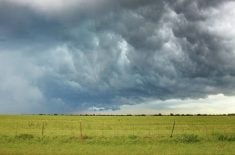Q: There is a large hog operation about 11/2 kilometres north of your place. When the north wind blows you can smell the odour in the yard and if you leave the windows open, hog barn odour fills the house.
You investigate and find that the operation has indeed obtained all the proper approvals and meets all the technical requirements specified by the province’s approving agency. What can you do? Can you sue the hog barn operator? Are there other avenues to take your complaint?
A: In common (court-made) law, odours from the neighbour’s place that interfere with enjoyment of your property are a nuisance. You are entitled to claim damages from your neighbour. In some cases, a judge might even grant an injunction ordering the owner to cease or change his activities to eliminate odours.
Read Also

Volunteers help exotic animal farm rebuild
Exotic animal farm loses beloved camel and pony to huge hail storm that gripped the Brooks, Alta. area as a community member starts a fundraiser to help the family recover from the financial and emotional damage.
In the 1970s and early 1980s, livestock operators in New Brunswick and Manitoba were successfully sued for nuisance. Many legislators saw such lawsuits as harassment of legitimate farming operations. In response, all provinces in the 1980s and 1990s passed legislation protecting farm operations from nuisance lawsuits.
Such laws (the Agricultural Operations Act in Saskatchewan, Agricultural Operations Practices Act in Alberta and the Farm Practices Protection Act in Manitoba) provide that a farm operator cannot be sued for nuisance if he is using normally accepted agricultural practices. Such laws apply to hog barns, confined feeding operations and other intensive livestock operations.
What if someone has a complaint about such an operation?
In each province there is a farm practices board that handles complaints about livestock operations. In addition to determining whether an activity is outside acceptable farm practices or contravenes conditions of approval, these boards try to mediate disputes between the complainant and the livestock operation. The boards can order that farm operations modify their operations or stop certain practices.
In Saskatchewan, the Agricultural Operations Review Board can be contacted at Room 202, 3085 Albert St., Regina S4S 0B1, 306-787-4693; in Manitoba contact The Farm Practices Board, 812 Ð 401 York Ave., Winnipeg, 204-945-4495. The process is slightly different in Alberta. There, as of January 2002, complaints are addressed to the Natural Resources Conservation Board, whose toll-free line is 866-383-6722.
The Alberta board first investigates complaints. If the operator is in breach of technical requirements or conditions of approval, it can take enforcement action. If the operation is in compliance but the board thinks there still is a nuisance, the matter can be referred to the minister, who can refer the matter to the Farmer’s Advocate Office to set up a peer review committee. This committee’s role is to determine if the operation is following normal agricultural practices.
Diverting nuisance complaints (the boards do not consider environmental or negligence claims) to a farm practice board has both advantages and drawbacks. First, the process is more informal and less expensive than going to court. It relieves farmers from having to face nuisance complaints. Court cases can take years to resolve and can cost each side tens of thousands of dollars in legal fees.
However, unlike court proceedings, farm practice boards cannot order that damages be paid to the complainant. They can only order that a livestock operation modify its practices or comply with conditions for such operations. Only if a matter clearly falls outside an acceptable farm practice – for example, liquid manure being poured into a ravine that flows into a neighbour’s field – can one sue. And even then, the legislation requires 90 days notice to the board before an action can commence and courts must consider any order made by the board to correct the situation. The onus is on the complainer to prove that the complained-about activity is outside acceptable farm practices.
Farm practice boards are restricted to looking at what is an acceptable practice, and it is beyond their mandate to look at whether intensive livestock operations are a valid way of raising livestock.
A Dalmeny, Sask., resident had a complaint about odours from a neighbouring livestock operation. Given the above legal restrictions, he could not sue the farm operation until he had gone through the Agricultural Operations Review Board. Instead he sued the local municipality in small claims court because it “wrongfully permitted both the continuation and expansion of the two operations” in contravention of the municipal development plan. The claim was dismissed, but is under appeal and will be heard in Queen’s Bench Court on Feb. 18.
Don Purich is a former practising lawyer who is now involved in publishing, teaching and writing about legal issues. His columns are intended as general advice only. Individuals are encouraged to seek other opinions and/or personal counsel when dealing with legal matters.
















